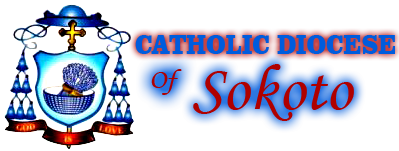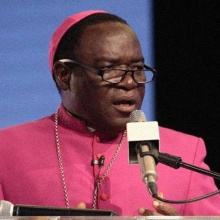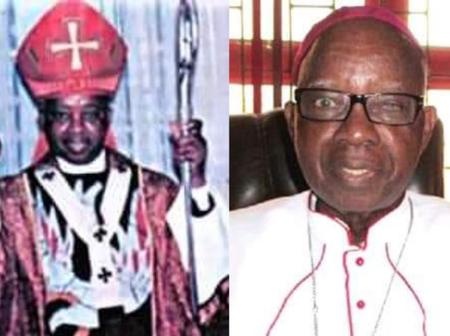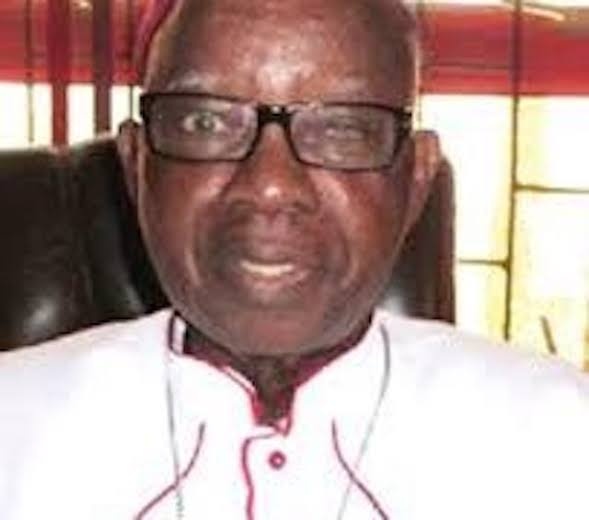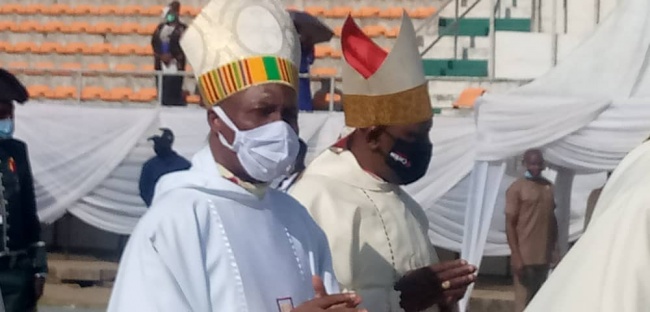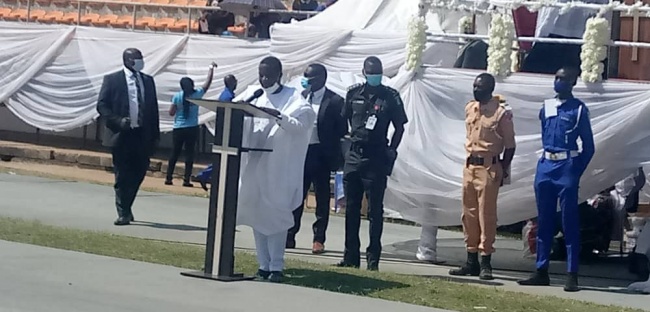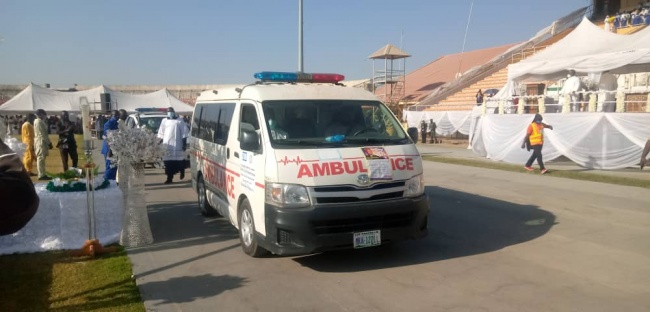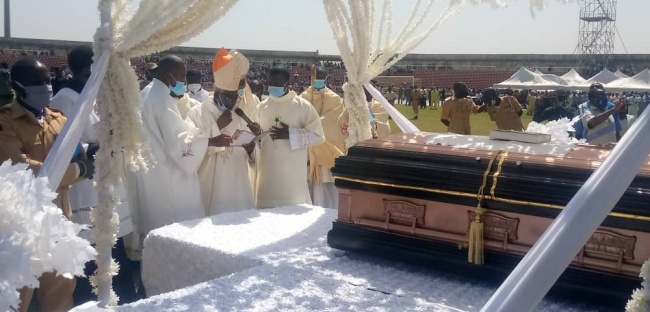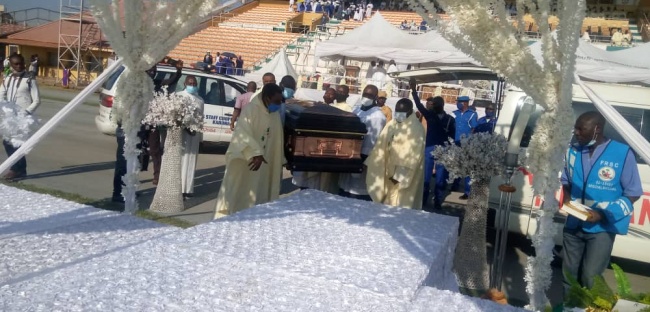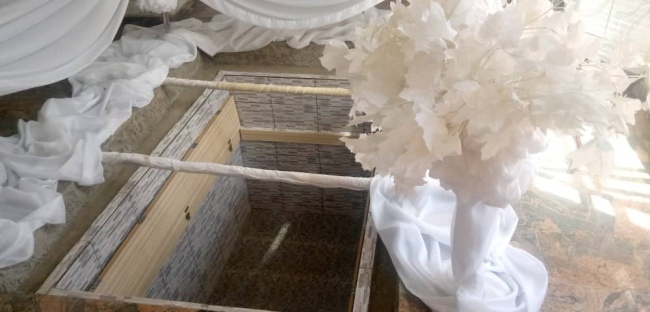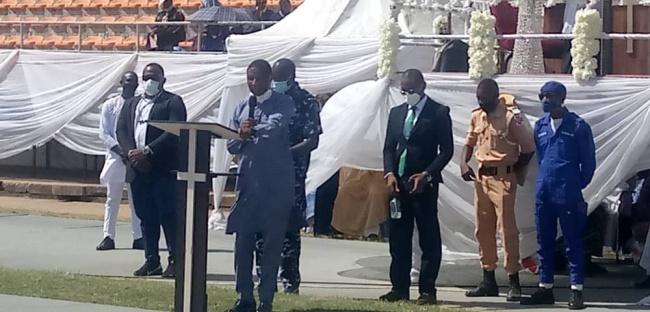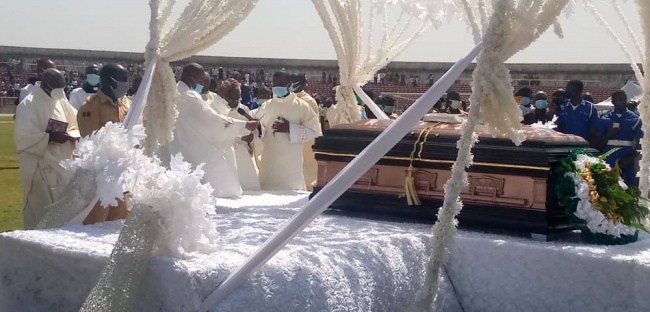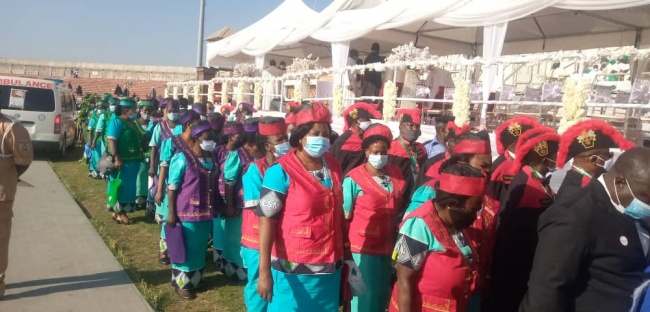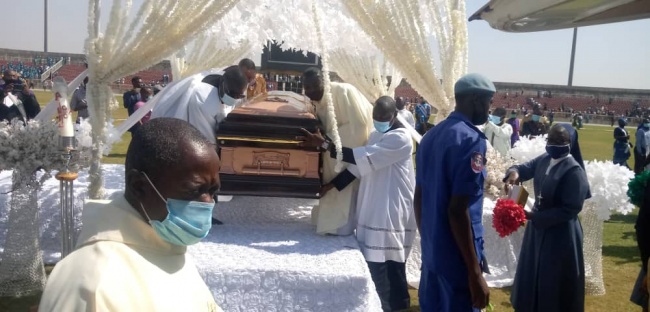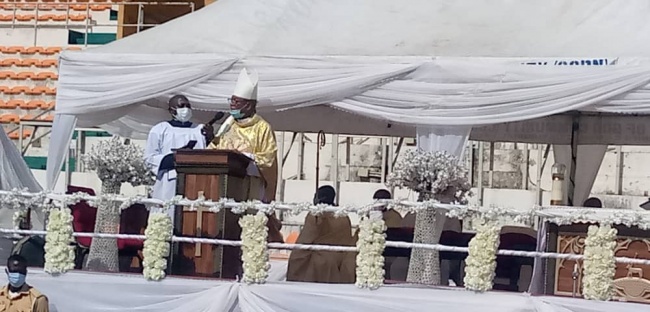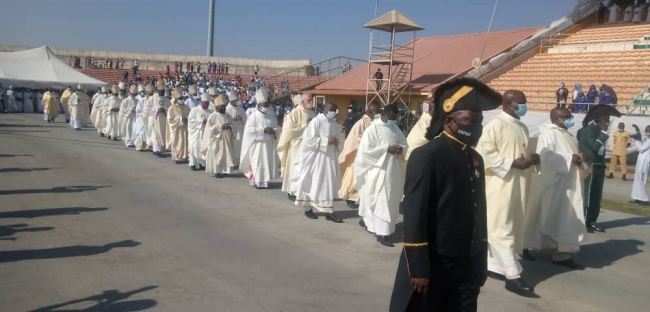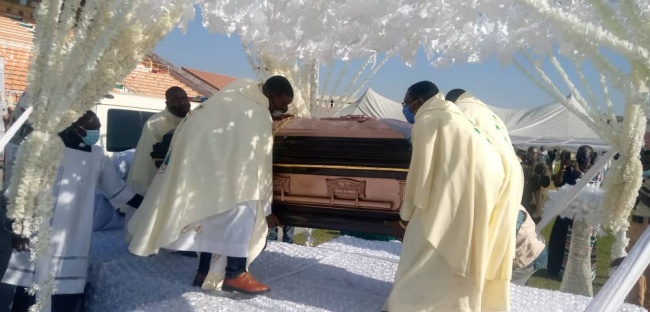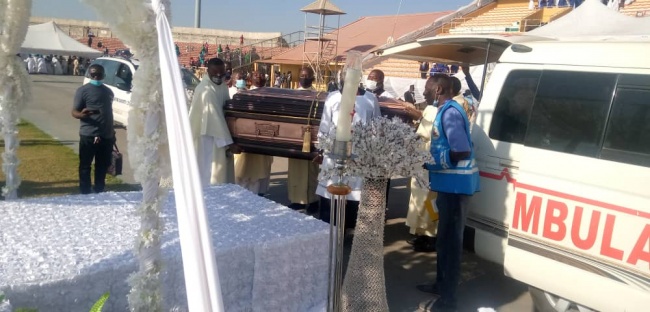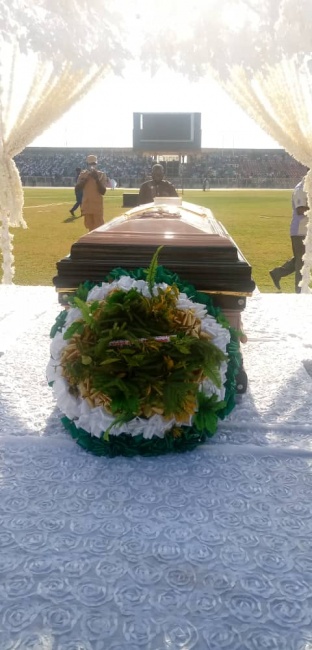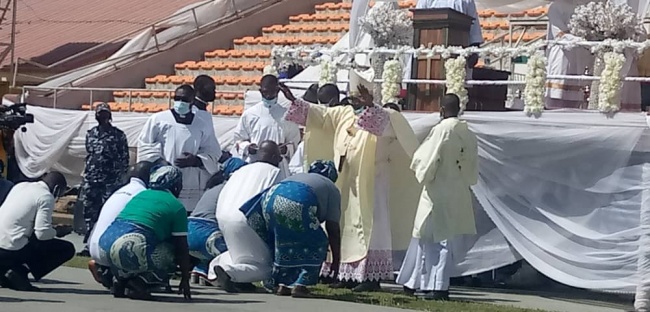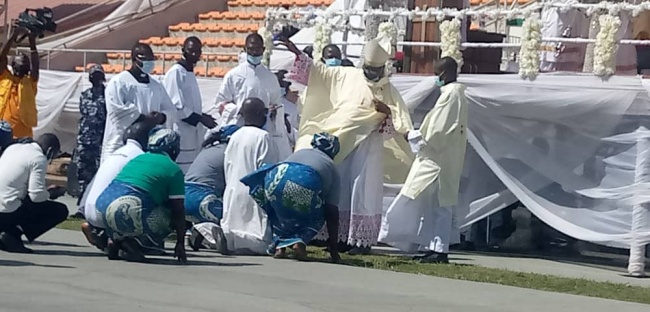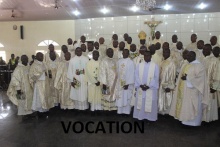Sermon at the Wake keep Mass for His Grace, Archbishop Peter Yariyock Jatau (1932-2020) at St. Joseph’s Catholic Cathedral, Kaduna on January 5th, 2021.
1. As I stand before you, I feel pulled between the poles of honour, humility and trepidation. I am honoured and humbled to be asked to preach in the wake keep of our beloved father, grandfather and great grandfather in the faith, His Grace, Archbishop Peter Yariyock Jatau. However, you are also asking me to perform an almost impossible task, namely, to pull the threads of the life and times of a rare human being within a short time. This is the basis of my trepidation. I therefore crave your indulgence as I, on your behalf, try to paint a few strokes of love on a canvass that is impossible to fill up. Like the six blind men of Hindustan, each of us can only tell a small part of what we experienced of this great man.
2. Today, our dear nation is like the proverbial farmer searching for his black goat. He has to do it with a sense of urgency because darkness is setting in as the sun quickly recedes. Our nation has become one huge waste land, huge debris of the deceit, lies, treachery, double dealing and duplicity. Nigerian politicians have turned our politics into a huge trojan horse, a hoax, a hall of guile and dissimulation. The levels of frustration are rising by the day and we can see all this in the rise in domestic violence and intercommunal conflicts. A combination of all these has turned us unto a nation at war with itself.
3. Nigerians complain that the country is full of Churches and Mosques and they cannot find the values of these religions in everyday life. We sin at home by stealing the nation’s resources but we seek repentance and forgiveness in Saudi Arabia and Jerusalem in the guise of lesser or higher pilgrimages. We make money from abandoning projects duly paid for by governments which have adopted Contractocracy as a governance mechanism. We are allowing others to use our money to develop their own infrastructure. Our elites all assembled in Dubai for Christmas and also to welcome the New Year. As virtue recedes into the sunset in our country, there is an urgent need for us to pause and take stock of what is required to save our country.
4. Remembering Archbishop Jatau is an opportunity to recall the contributions of Christian Missionaries and Christian education to laying the foundation for the production of the quality and caliber of men and women of yesterday whose legendary moral fiber still resonates in Nigeria today. Recall, for example, just in what is today known as Kaduna State, such institutions as: College of Mary Immaculate, Kafanchan; St. Enda’s College, Zaria; St. John’s College, Kaduna; Queen of Apostles College, Kaduna; St. Mary’s College, Fadan Kaje; Sacred Heart College, Kaduna; St. Anne’s Primary School, Kaduna; St. Louis College, Zonkwa; St. Bartholomew’s College, Wusasa; St. Bartholomew’s Wusasa; ECWA Secondary School, Kagoro.
5. Look at the quality of manpower that the Church around Wusasa, Zaria, produced so early on in the history of our nation. For example, in 1924, Kaka Audu became the first Woman to write the Cambridge Examination in Northern Nigeria (the Sardauna was only 12 years old!). R.A.B Dikko, Fulani convert to Christianity, became a Medical Doctor in 1938 and was the founding President of Jamiyar Mutanen Arewa which metamorphosed into the Northern People’s Congress, Ambassador John Garba was the first African to be appointed to the World Bank, Muazu Audu and P.O. Ishaku were the first Pharmacists in Northern Nigeria, Mrs. Afiniki Hamman was the first Woman to become the Controller of the Nigerian Broadcasting Corporation, Mallam J.H. Chindo was the first Controller of the Nigerian Broadcasting Corporation and Editor of Nigerian Citizen Newspapers, Yusuf Dantsoho a leading PRP Politician was a product of St. Bartholomew’s School Wusasa, Professor Ishaya Audu became the first African Vice Chancellor of Ahmadu Bello University, Zaria, Professor Adamu Baikie became the first Nigerian Dean of the Faculty of Education and the first Professor of Education in northern Nigeria and the first Nigerian to become a Vice Chancellor in three different universities in Nigeria and Lesotho. Recall, legends like, Generals Yakubu Gowon, Theophilus Danjuma, IBM Haruna, Canon Mohammed, pioneer Chairman of the Public Complaints Commission and Code of Conduct Bureau Justice Jacob Haruna Dandaura was the first Hausa Christian to become the Sarkin Sabon Gari of Kano, Mallam John Tafida Umaru former Sarkin Wusasa was the first to introduce Hausa Broadcast in USSR. Our own brother, uncle and father, Sir Brendan Shehu, a Fulani convert from Islam, pioneered Film in Nigeria. Some of these and many more came from Fulani, Hausa and other backgrounds to form a formidable moral voice in Northern Nigeria. Sadly, years of horrible politics, ignorance, prejudice have turned religion into a weapon of death, thus killing the glory of the region. We are now reaping the harvest of the seeds we sowed yesterday and the children born from this ugly union have rejected education and are now the killers of Boko Haram. They are the bandits holding our nation hostage. We must make a quick turnaround and restore sanity.
6. To celebrate this relationship and to appreciate what the Church had done, in his Independence speech, Sir Abubakar Tafawa Balewa, the Prime Minister stated among other things: “We are grateful to the British officers whom we have known, first as masters, and then as leaders, and finally as partners, but always as friends. And there have been countless missionaries who have laboured unceasingly in the cause of education and to whom we owe many of our medical services.” The Prime Minister was aware of what the Catholic Church had done.
7. Archbishop Peter Jatau and his generation took over the mantle of leadership from those very dedicated missionaries, raised the bar and by sheer diplomatic efficiency, sought to forge and strengthen a viable relationship between Church and State. Along with great men like the late Alayedeino, Bishop Ogboyomi, Ambassador Jolly Tanko Yusuf, Engineer Salifu, Mr. Dogo, and a host of others, they held us as the turbulent waters of the civil war, internal crisis and conflicts created severe cracks on the structures of unity and development in northern Nigeria. Trust in a united north came under severe strain coming to a climax with the takeover of schools that had been built with no contribution from the state. All our schools, built with our own sweat are still held in captivity by state governments. Almost all the State governments in the south have returned schools to the Churches and Anambra state today is a shining example of the gains. Every state that returned schools to the Churches is now far better off. While their students are receiving international awards, scholarships and so on, our youth in the north are joining Boko Haram, criminal gangs of bandits and are enveloped in poverty. The North will soon be in the hands of these killers very soon because today’s Almajiri is tomorrow’s leader!
8. Post-civil war Nigeria faced severe challenges but nowhere was this more so than the North with Kaduna being the epicentre. Suspicion gradually set in. No one needs to recite the litany of woes and bloodshed that have characterised the great city of Kaduna. Archbishop Jatau saw through the good and the bad times. Amidst all this, like the moral giant that he was, he seemed to have heeded the words of the great American poet, Max Ehrmann (1872-19450), who, in the famous poem, Desiderata wrote:
Go placidly amid the noise and the haste, and remember what peace there may be in silence. As far as possible, without surrender, be on good terms with all persons. Speak your truth quietly and clearly; and listen to others, even to the dull and the ignorant; they too have their story.
9. Today, the ruling elites over the years failed to manage the diversity of this great region in general and the great city of Kaduna in particular. Toxic politics fueled and produced much hatred which destroyed the dreams and moral vision of a good city. Today, Kaduna has come to characterise some of the out layers of the Inferno. Today Kaduna is a tale of two cities. However, it is gratifying to note that the new government is embarking on some excellent physical infrastructure which will transform Kaduna. We pray and encourage the Governor will be even handed and to see the broader picture because social infrastructure for markets, entertainment have more capacity for dialogue and peace than a million seminars.
10. It is time to pause and ask, where have all the good men gone? Where did it all begin to go wrong for us? Where did the building blocks of trust begin to collapse? Why has sin and sinfulness enveloped our nation? Why has our sun set at midday? How did the milk of humanity become the blood of death in Nigeria? Is it in the stars? I have heard many very educated Nigerians ask, what did we do to the gods? When Jonah was in his boat, he was the only one running away from the will of God. It seems that today, ours is a boat in which almost all passengers are running away from the will of God.
11. The real challenge for us now is what really is Archbishop Jatau’s legacy? How should we remember him? Who was he for us as a community? My relationship with Archbishop Jatau would be the stuff of a large book. However, I have fond memories of a man of great affection for his Priests, love for the people of God and love for the Church that he led. He was ordained a Priest on July 7th, 1963 and a consecrated a Bishop in 1972; I was only two years in the Major Seminary. As a Priest, I could never, never, never ever have wished for or hoped for any other Bishop as my Bishop. I am convinced that had he not been my Bishop, I am convinced that my life would have been totally different as a Priest. I am not sure how many Bishops would have coped with my troubles. I started making trouble very early on in life as a young Seminarian, but it was often good trouble. I asked questions, I made my point rather strongly and Archbishop knew that this was not an act of disobedience but that of filial confidence.
12. Archbishop Jatau did not only encourage me, but made it clear to me that he was happy and believed in with what I was doing. Even at a very early age as a Priest, he often sought my views on matters that concerned me. Not for one day did he ever give me an assignment that he did not seek my views. I barely six months a Priest when I was elected a Member of the Consultors, I was told I had the highest number of votes and therefore would have to become the Chairman at the meetings. Apart from the Archbishop, I was the only indigenous priest and by far the youngest and most inexperienced. In our first meeting with me as Chairman, Fr. Liam Burke raised his hand to speak and then Archbishop raised his hand. I asked Fr. Burke to speak but he deferred to His Grace. I asked Fr Burke to go ahead. Having vacated his seat and now sitting by my right, His Grace turned to my tiny frame perched on the Chairman’s seat and said: I am the Archbishop. I looked at him and said: Your Grace, I am the Chairman. We all laughed but after the meeting, he said to me: You will be a good Chairman!
I was barely in my second year as a Priest when one day he called me to his office to announce that he had just returned from a meeting of the Bishops of Kaduna Province and that it has been resolved that I should return to the Seminary as the Dean of Discipline. I was only in my second year as a priest. How could I go back to take over a job that was meant for much older and experienced priests? I would be the youngest and most inexperienced Dean of Discipline in the history of the Seminary! (But today, some of my students then are now my bosses, Archbishop Matthew Ndagoso, Archbishops Kaigama and Matthew Audu are evidence that I definitely worked well as Dean of Discipline!). In his characteristic manner, he said to me: “The Bishops have decided that you should go back to the Seminary as the Dean of Discipline, but I do not know what you think. Go and think about it and let me know.” It sounded strange but that was Archbishop Jatau: I wondered, the Bishops of the Province have taken a decision, yet my Archbishop was speaking to me as a messenger. He was asking me to think about it. I knew that the exit door was already firmly locked and it was impossible for me to say No. That was how sensitive he was about his Priests and this trait would trail all my assignments from being appointed to the Catholic Secretariat to all my appointments from civil authorities.
13. Archbishop’s self-effacing humility was legendary. In my first year as a priest, my late friend, Fr Anthony Sarki and I travelled to Jos and we spent the night with Msgr Kevin Aje as he then was. We returned to Kaduna and I discovered I had forgotten my Breviary. I did not know what to do at that time of poor communications. One day, Archbishop Jatau showed up in St. Andrew’s around 8am in the morning. I welcomed him and wondered what had brought him so early, but he held out my Breviary saying, almost like a young Seminarian, “Msgr. Aje said you forgot your Breviary in his house and asked me to give it to you!” That was my dear Archbishop.
14. By 1982, I had never met Cardinal Ekandem in real life. One morning, Archbishop asked me to come to his office. I arrived his office, wondering what the reason was only for him to deliver a terse message to me: “I have been contacted by Cardinal Ekandem and he says he wants to see you in Abuja tomorrow. So, get ready, I will come and pick you tomorrow morning to Suleja.” I was literally shaking. What is Cardinal looking for me for, Your Grace? I tried but could not get a word out of the Archbishop. I hardly slept that night. The next day, Archbishop showed up in Kakuri and we started a painful and endless journey to Abuja. I wondered what awaited me at the other end. I tried to ask Archbishop Jatau what it was that he and I couldn’t settle especially as I knew we had had no quarrels or disagreement. Was seeing the Cardinal going to be the end of my priesthood? That is how I was led to the Cardinal’s presence and the great man shocked me by requesting me to come and work with him in Abuja. The rest is history. The stories are many and all of us his Priests have ours.
15. The challenge for us now is to review the future and think about how to immortalize this great legend of a man, a man who fought and won many wars without lifting his finger. I can hardly remember seeing Archbishop go into a temper. He never raised his voice at me. I do not think that this was because he loved me in particular. He loved and treated all his priests with the gentle tenderness of a grandfather. He gave more carrot than stick. He never reminded you of any mistakes you made, unless you persisted in your bad ways.
16. As priests, we all take a vow of obedience. However, on three occasions, I broke this vow in the presence of Archbishop by way of filial disobedience but I incurred no punishment. First, perhaps persuaded by my good friends, Justice Kumai Pius Aka’ahs and Emmanuel Toro, His Grace asked me to go to Rome to study Canon Law early in 1977. In his usual manner, he asked what I thought about it. I told him that I would rather read Law in Ahmadu Bello University especially as Canon Law will not allow me to practice in the courts in Nigeria. We dropped the matter. Much later on, he asked what I thought about going to Ahmadu Bello to teach and also serve as a Chaplain. I told him that I would do either but not both. I prefer to be either a full time Chaplain or a Teacher. Combining both would be a problem. As a Teacher, I might likely engage in ASUU politics and get into trouble.
17. I had another moment of filial disobedience. After I finished serving at Oputa Panel, President Obasanjo offered me an appointment, was quite powerful. I told the President that first, as a Priest, I had no wish to serve in Government directly under any President. When I tabled this before my Archbishop, he told me that on the contrary, I should go ahead and take the job. He argued that because it could enable me to influence policy directly. He asked me to think it over but I told him my mind was already made up. I called to tell the President that I was not available for the job. When I gave my Archbishop my reasons, he accepted and the matter died there.
18. Anyone and everyone must have their stories about this great man. However, I want to end by raising questions about the challenges of prophetic witness in the Catholic Church. Time will not allow me to go into any details of this. However, it is important that we all understand that the challenge of any Priest is to think hard about what faithfulness to the Gospel means along with faithfulness to his or her country. The vision and the mission statements of Jesus are in Lk. 4:7 and John 10:10. Jesus speaks of the mission to set the captives free. Jesus said in John 10:10 that “I have come that you may have life and have it to the full.” What does freedom mean and what does a full life mean? Interpreting these texts, putting flesh on them, faithfully carrying them out is what led Jesus to the Cross. It is the essence of our mission as Christians. Archbishop Jatau was faithful at his duty post in the frontiers of fighting injustice and corruption in our society.
19. The duty and responsibility of government is the security and welfare of its citizens. The Priest is a watchman, one whose duty is to watch over the city and to raise his voice whenever he cites danger. He calls on those who lead to remain faithful to their duties. A society always frames its hopes, fears and dreams in Documents known as Constitutions and a Constitution will always remain the reference point for measuring the efficacy of a government. This is the challenge that the late Martin Luther King faced when he delivered his famous, I have a Dream Speech. Among other things, he said:
In a sense we’ve come to our nation’s capital to cash a check. When the architects of our republic wrote the magnificent words of the Constitution and the Declaration of Independence, they were signing a promissory note to which every American was to fall heir. This note was a promise that all men, yes, black men as well as white men, would be guaranteed the unalienable rights of life, liberty, and the pursuit of happiness.
It is obvious today that America has defaulted on this promissory note in so far as her citizens of color are concerned. Instead of honoring this sacred obligation, America has given the Negro people a bad check; a check which has come back marked “insufficient funds”. But we refuse to believe that the bank of justice is bankrupt. We refuse to believe that there are insufficient funds in the great vaults of opportunity of this nation. And so, we’ve come to cash this check, a check that will give us upon demand the riches of freedom and the security of justice.
20. Our duty is to reject the notion of corrupt governments all over Africa that somehow, the Lord has not provided for every society. He has and a nation like ours that is so richly blessed must not hold its citizens to ransom by pretending that there are hard times. We do not see a reflection of these hard times in the lifestyle of our public officers who daily call on the citizens to make sacrifices while they wallow in privilege. When they call for us to tighten our belts because there is recession, that oil prices have fallen, that there are problems with balance of payments and so on, the Priest at the duty post must say that there are sufficient funds, that we cannot accept bad cheques.
21. In his love for education, he guaranteed us a future. That we whom the country calls minorities can stand shoulder to shoulder with anyone anywhere in the world, is a testament to dream. We cannot turn back on education because education is the mirror that helps us to know what we are worth. The alternative is the darkness which makes our unredeemed selves killers and haters. Embracing education is the tribute we owe him. If the North is to progress, the Governors must decide and return all our schools to us. It is the only guarantee that Mustapha and Christopher, Husseina and Faustina can play together, embrace one another in love and become citizens of a great country. So, tonight, I leave you with the words of Cardinal Ratzinger (as he was then) at the funeral of the late Pope John Paul II on April 8, 2005, when he said: “We entrust your dear soul to the Mother of God, your Mother, who guided you each day and who will guide you now to the eternal glory of her Son, our Lord Jesus Christ. Amen.” Your Grace, like St. Stephen, the first martyr, may the gates of heaven stand erect till you have passed through. Amen.
Rest in Peace, beloved Baba.
